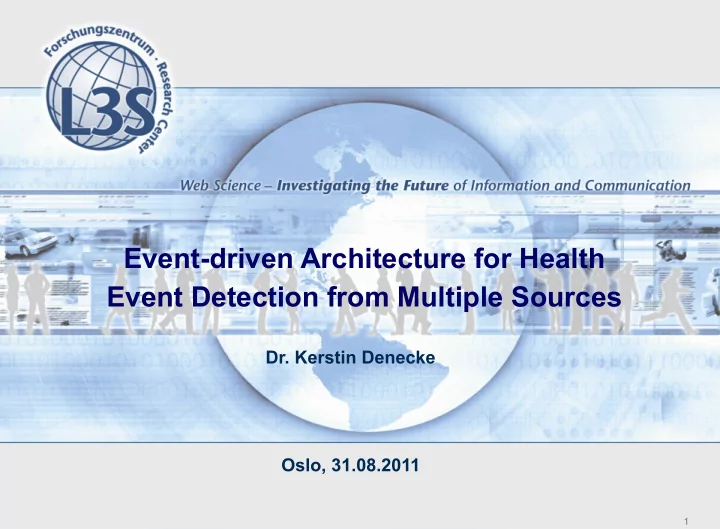

Event-driven Architecture for Health Event Detection from Multiple Sources Dr. Kerstin Denecke Oslo, 31.08.2011 1
Agenda • Motivation • Event-driven Architectures • Architecture for Health Event Detection • Conclusions and Future Work Kerstin Denecke 8 September 2011 2
Motivation: The Threat • Infectious diseases lead to public health threats • Contributing factors: n global warming, globalization, air traffic …mutation, spread, … • Technologies to early detection are required è Early Detection by Disease Surveillance è Broad range of sources Kerstin Denecke 8 September 2011 3
Requirements for (improved) surveillance • Diversity of information sources • (Additional) information in time • Filtering along relevance, novelty, source... • Visualization with innovative techniques • User feedback and interaction è Real-time processing of huge amounts of data Kerstin Denecke 8 September 2011 4
Event-driven Architectures • Behaviour of a system is orchestrated around the production, detection and consumption of events • Information can be propagated in near-real-time throughout a highly distributed environment • Event: • a significant or meaningful change in state • message, token, count, pattern • based on an asynchronous message-driven communication mode Kerstin Denecke 8 September 2011 5
System architecture User Modeling and User interface Recommendation Indicator Detection and Signal Generation TV / Radio Twitter Content Collector and Blogs Document Analysis Online News Kerstin Denecke 8 September 2011 6
Information flow Kerstin Denecke 8 September 2011 7
M-Eco System – Result Page Kerstin Denecke 8 September 2011 8
Conclusions and Future Directions • Surveillance system that follows event-driven design principle • Currently first prototype is tested • First observations: n difficulties in collecting the right data n algorithms are sometimes slow when processing large data sets è Improvements are necessary (data stream processing) Kerstin Denecke 8 September 2011 9
References Denecke K et al.: The Medical Ecosystem - Personalised Event-based • Surveilllance . In: Safran C, Reti S, Marin HF: Studies in Health Technology and Informatics: MEDINFO 2010. Proceedings of the 13th World Congress on Medical and Health Informatics, IOS Press, Amsterdam, 2010, ISBN 978-1-60750-587-7, pp. 1382 Stewart A, Fisichella M, Denecke K: Detecting Public Health Indicators from the • Web for Epidemic Intelligence. 3rd International Conference on Electronic Healthcare (eHealth 2010), December 13-15, 2010, Casablanca, Morocco Fisichella M, Stewart A, Denecke K, Nejdl W: Unsupervised Public Health Event • Detection for Epidemic Intelligence . CIKM’10, October 25-29, 2010, Toronto, Ontario, Canada Denecke K, Stewart A: Learning from Medical Social Media Data: Current State • and Future Challenges . In: White B, King I, Tsang P: Social Computing in Higher Learning Environments: How Media, Tools, and Platforms Change Learner ’ s Behaviour. Springer Verlag, Heidelberg, March 2011 Kerstin Denecke 8 September 2011 10
Event-Driven Architectures for Health Event Detection from Multiple Sources Dr. Kerstin Denecke Forschungszentrum L3S denecke@L3S.de http://www.meco-project.eu Thank you for your attention!
Recommend
More recommend